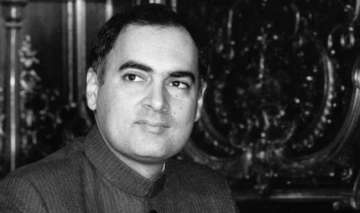When Rajiv Gandhi's chat with in-laws gave officer nervous moments
New Delhi: In the early 1980s, when Indira Gandhi was the prime minister, her son Rajiv Gandhi was once so engrossed in explaining to his parents-in-law the features of a new navy ship that he

New Delhi: In the early 1980s, when Indira Gandhi was the prime minister, her son Rajiv Gandhi was once so engrossed in explaining to his parents-in-law the features of a new navy ship that he gave some nervous moments to a bureaucrat in the defence ministry who feared he might be late for an official event that night.
Luckily for Ashok Pandey, the then special assistant to Minister of State for defence Shivraj Patil, Rajiv Gandhi's briefing got over and he along with Indira Gandhi and the minister were able to attend the dinner with naval officers.
Mr Pandey, who served in Assam and Meghalaya as a young IAS officer at the outset of his career before going on to handle crucial responsibilities at the Centre and in Bihar, has written a book - 'From Inside the Steel Frame', which is replete with insights into the changing face of India, and many vignettes of life in the districts, state capitals and around the seat of power in Delhi.
"I cherish the memory of a trip to Bombay with the Prime Minister (Indira Gandhi) on her plane to celebrate the launch of a new ship and the Navy Day. Rajiv Gandhi, her son and a future prime minister, was also with us," he writes in the book, published by Palimpsest.
"After reaching Bombay, my minister (Shivraj Patil) and I were taken to the Mazagon dock where the newly acquired ship was gleaming in power and glory. Rajiv Gandhi, curious, keenly observant, was showing different parts of the ship to his parents-in-law."
"Technically sound, he was explaining to them in Italian, different features of the vessel. They, I could see, understood and appreciated the points he was making. Meanwhile, my minister left me there and went to attend some political meetings with the Prime Minister (Indira Gandhi). I remained with Rajiv Gandhi all the time," Bihar-born Pandey recalls.
"When it was taking a bit longer than I expected, I told him to hurry up as he could be late for the next programme. He replied that he had no other engagement. I was in a dilemma as the minister and the Prime Minister (Indira Gandhi) were to attend a dinner with the naval officers.
"I too was required to attend it. I did not tell Rajiv Gandhi all this, but luckily the briefing was over soon. I made it to the dinner on time and though highly formal, it was a very enjoyable evening," he writes.
The book focuses on the centrality of the steel frame, its crucial role in the life of India and at the same time, captures its pitfalls and entrenched biases as the author himself experienced them towards the end of his career.
According to the author, Indira Gandhi's other son Sanjay Gandhi was "somewhat temperamental, biased and whimsical in his judgement of situations and people" and was instrumental in the sacking of many government officials.
"While working as special assistant to JB Patnaik in the ministry of tourism and civil aviation, I learnt about the minister being pressured by none other than the all-powerful Sanjay Gandhi who took a special interest in the affairs of civil aviation," he writes.
Mr Pandey cites another example to drive home his point. "Once JB Patnaik received a confidential letter from Air Marshal Zaheer, civil aviations director general, mildly complaining about Sanjay Gandhi flying an aircraft without caring for security norms and even without informing the far-flung small airports where arranging even minimum emergency provisions like fire-fighting could be possible only after due notice was received well in advance."
"The contents of the letter were conveyed to Sanjay Gandhi to make him aware of the concern of the director general. All this must have irritated Sanjay Gandhi, who had gained tremendous power in 1980 after a landslide victory of the Congress in the mid-term elections," the book says.
As predicted, Air Marshal Zaheer was "unceremoniously removed from his job for no fault of his own", Mr Pandey says.
Rajiv Gandhi, on the other hand, was a simple and good-hearted man, he says, adding he was perhaps "unsuitable for the culture of crookedness in politics".